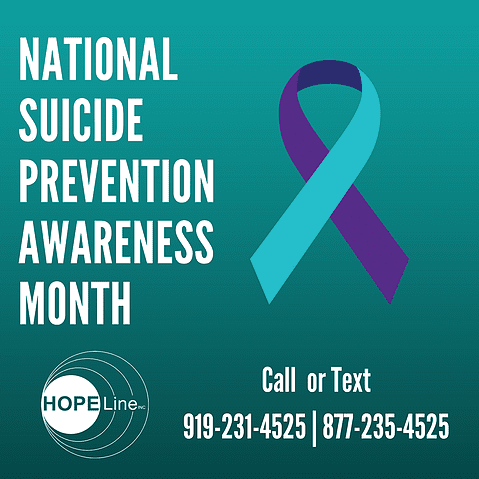 Christians committing suicide? Sounds like an oxymoron. But heh, mental illness doesn’t necessarily go away when people let Jesus into their lives. I didn’t know that this month, September, is designated National Suicide Prevention Month.
Christians committing suicide? Sounds like an oxymoron. But heh, mental illness doesn’t necessarily go away when people let Jesus into their lives. I didn’t know that this month, September, is designated National Suicide Prevention Month.
I knew a 36-year old professing Christian woman who sometimes had suicidal thoughts. She said she wanted to die and go to heaven to be with her deceased dad.
Last year, an atheist friend of mine introduced me to a new Christian, a 60-year old businessman. He was so fired up about Jesus and salvation that he was telling everybody about it. The guy was an excited, joyful evangelist. I wanted to see the guy again. We had talked for several minutes and I was deeply moved by his testimony. One week later, my friend told me this guy committed suicide.
Last month, a dear friend of mine died after a 15-year bout with prostate cancer. I attended the memorial service to see lots of Christian friends I had not seen in years. The common discussion among them was that our friend was now in a better place and with no more pain, being consciously and joyfully in heaven with Jesus. His wife said this over-and-over to me. I don’t think I heard anybody say anything about our friend arising from the dead someday in the future in what Christians have always called “the resurrection” at the Second Coming of Christ. Just as Christians have believed Jesus arose from the dead, so they also have believed they will be resurrected from the dead sometime in the future. But this idea of the immortal soul going to heaven at death is to some degree silencing the fundamental Christian belief in the resurrection.
 Monday, pastor Jarrid Wilson of the mega-church Harvest Christian Fellowship Church, in Riverside, California, committed suicide. He was only thirty years old. He and his wife were good looking people with two young children. Moreover, pastor Wilson had a significant ministry at the church as a mental health advocate. Senior pastor Greg Laurie said Jarrid “wanted to especially help those who were dealing with suicidal thoughts.”
Monday, pastor Jarrid Wilson of the mega-church Harvest Christian Fellowship Church, in Riverside, California, committed suicide. He was only thirty years old. He and his wife were good looking people with two young children. Moreover, pastor Wilson had a significant ministry at the church as a mental health advocate. Senior pastor Greg Laurie said Jarrid “wanted to especially help those who were dealing with suicidal thoughts.”
Harvest Christian Fellowship Church has quite a profile. So does Pastor Laurie. He is also an evangelist who has written seventy books. He has a weekly TV show on TBN and a radio program. His mentor was Chuck Smith of the charismatic Calvary Church denomination. Laurie also serves on the board of directors of the Billy Graham Evangelistic Association.
In fact, on Jarrid Wilson’s Twitter page, he posted several times that September is National Suicide Prevention Month. Then he committed suicide this month, in September. Pretty strange. Why did he choose to do it in Suicide September? Regardless, it is such sad tragedy when a person commits suicide. I believe very strongly that when people get depressed, they should seek counseling help. The irony about this situation is that Pastor Jarrid Wilson was that help.
I suspect there have been numerous professing Christians in the nearly 2,000-year history of Christianity who have committed suicide because they were depressed and believed their conscious souls would instantly go to heaven to be happy there; but if they had known the biblical truth about this–that at death unconscious human souls immediately go to Sheol/Hades to await resurrection–they would not have killed themselves.
On Monday, apparently right before Wilson committed suicide, he wrote on his Twitter page, “Loving Jesus doesn’t always cure suicidal thoughts. Loving Jesus doesn’t always cure depression. Loving Jesus doesn’t always cure PTSD. Loving Jesus doesn’t always cure anxiety. But that doesn’t mean Jesus doesn’t offer us companionship and comfort. He ALWAYS does that.”
It has been only two days ago since this occurred. CNN reports that Jarrid’s wife Juli wrote, apparently on his Twitter page, “No more pain, my jerry, no more struggle. You are made complete and you are finally free. Suicide and depression fed you the worst lies, but you knew the truth of Jesus and I know you’re by his side right this very second.” She added, “suicide doesn’t get the last word.” She seems to mean Jarrid has overcome death by his conscious soul going instantly to heaven to be with Jesus.
That’s just about what all Christians believe–that when they die they go to heaven to enjoy a much better life than anyone can experience here. I believed this for nearly forty years. But then I got enlightened. I attended a conference in my hometown of Houston that was about the afterlife. It was hosted by biblically-informed Christians from the UK who published a magazine entitled Resurrection. That’s when I became convinced that I had been taught an untruth all of those years about the afterlife. I received and read this monthly publication for the next five years or more.
The Bible nowhere says the human soul is immortal or that when believers die their conscious souls instantly go to heaven. The two main biblical texts cited to support this false teaching are Philippians 1.21-23 and 2 Corinthians 5.1-8. But these texts are being misinterpreted to say that. What the Bible does teach is that without the future resurrection there is no hope beyond the grave. The Apostle Paul is very clear about this in his brief treatise on resurrection in 1 Corinthians 15. In light of this, the two aforementioned Pauline texts should be understood like this: when people die their soul will not be conscious at all until the resurrection. Thus, Paul can say that when he dies, it will be as if he will then meet Jesus in the resurrection since his soul will know nothing during what scholars call “the intermediate state,” that is, the time between death and resurrection. Martin Luther believed this way and explained it like sleeping and the alarm clock awakening us, comparing that to Jesus shouting us at his coming and simultaneously our resurrection (cf. 1 Thessalonians 4.16).
The New Testament doesn’t teach very much about the intermediate state, but the Old Testament does. The interesting thing about this is that most Christians know something about the New Testament–that added portion to holy scripture which makes it the so-called Christian Bible–but Christians know very little about the Old Testament, the so-called Jewish Bible, except for a few of its stories.
I think the Old Testament says over 100 times that when God’s people die, their souls immediately go to the place of the dead. The Old Testament calls it Sheol. But most Christians don’t know that because they read English translations of the Bible that do not have this word Sheol in it. Sheol should be transliterated since it is a place-name. The NASB and ESV transliterate it, thus “Sheol.” The NIV never reads “Sheol.”
I was shocked last year when I heard the pastor of the large church I attend say that only recently, after being a Christian for nearly forty years, he found out about Sheol in the Old Testament. Yet he has a degree from a seminary and knows some Hebrew in order to read the Old Testament in its original language, which is Hebrew. When translators of many English Bibles come to the word sheol in the Hebrew Bible, they translate it “the grave,” “the pit,” or the like.
The word sheol occurs sixty-seven times in the Hebrew Bible. It was the Hebrews’ name for the place of the dead. Many ancients believed like the Hebrews, that when people died their souls went to a certain place. The most common word for it was “the underworld.” Some also had a more descriptive name for it as well. For instance, the Greeks called the underworld, where dead human souls went, Hades. They called it that since they believed in a god named Hades and that his job was to administer the place of the dead–the underworld. This god Hades was later called Pluto by the Romans.
This belief about souls being immortal and them going to heaven when people die was invented by Greek philosophers hundreds of years before the advent of Christianity. The early Christians strongly opposed this Greek belief about the afterlife. It was centuries later that Christians began to adopt this Greek belief about an immortal soul. But they did so because it was more palatable, not because it was in the Bible.
Neo-Platonic Greeks believed the soul was pure and the body was evil or the source of evil. They explained it as the pure soul inhabiting the sinful body as if it is a prison. They therefore viewed death as a friend, the freeing of the soul. The Apostle Paul teaches the exact opposite, saying, “The last enemy to be destroyed is death” (1 Corinthians 15.26). Paul says we believers “wait for the blessed hope” (Titus 2.13), which is resurrection, not going to heaven when you die. (See “The Blessed Hope of Christians Is Resurrection, Not Death.”)
In fact, in one of Paul’s highlights in his evangelistic travels, he preached at the famous Areopagus at Athens (Acts 17.22). He concluded his message by saying of Jesus, “‘While God has overlooked the times of human ignorance, now he commands all people everywhere to repent, because he has fixed a day on which he will have the world judged in righteousness by a man whom he has appointed, and of this he has given assurance to all by raising him for the dead.’ When they heard of the resurrection of the dead, some scoffed” (vv. 30-32).
The problem with believing in the false notion that at death peoples’ souls go to heaven to enjoy conscious bliss is that it logically nullifies the necessity of resurrection. Worse than that, it can influence depressed people to commit suicide. I suspect that the fellow I mentioned above, who I met and one week later was dead, had that experience. That is why it is so important to get this teaching about the afterlife correct, thus according to the Bible and not peoples’ emotions, since they love the idea of their deceased loved ones being happy and rejoicing in heaven and even looking down upon them.
The premiere book about the afterlife, and a book that all Christians should read, is Life After Death: A History of the Afterlife in Western Religion (Doubleday, 2004). The author, Dr. Alan Segal, was a Jewish scholar of the New Testament. Segal, now deceased, was an outstanding scholar and person whom I met. This book is about 900 pages in length, but you only need to read about 100 pages of it on this topic.












